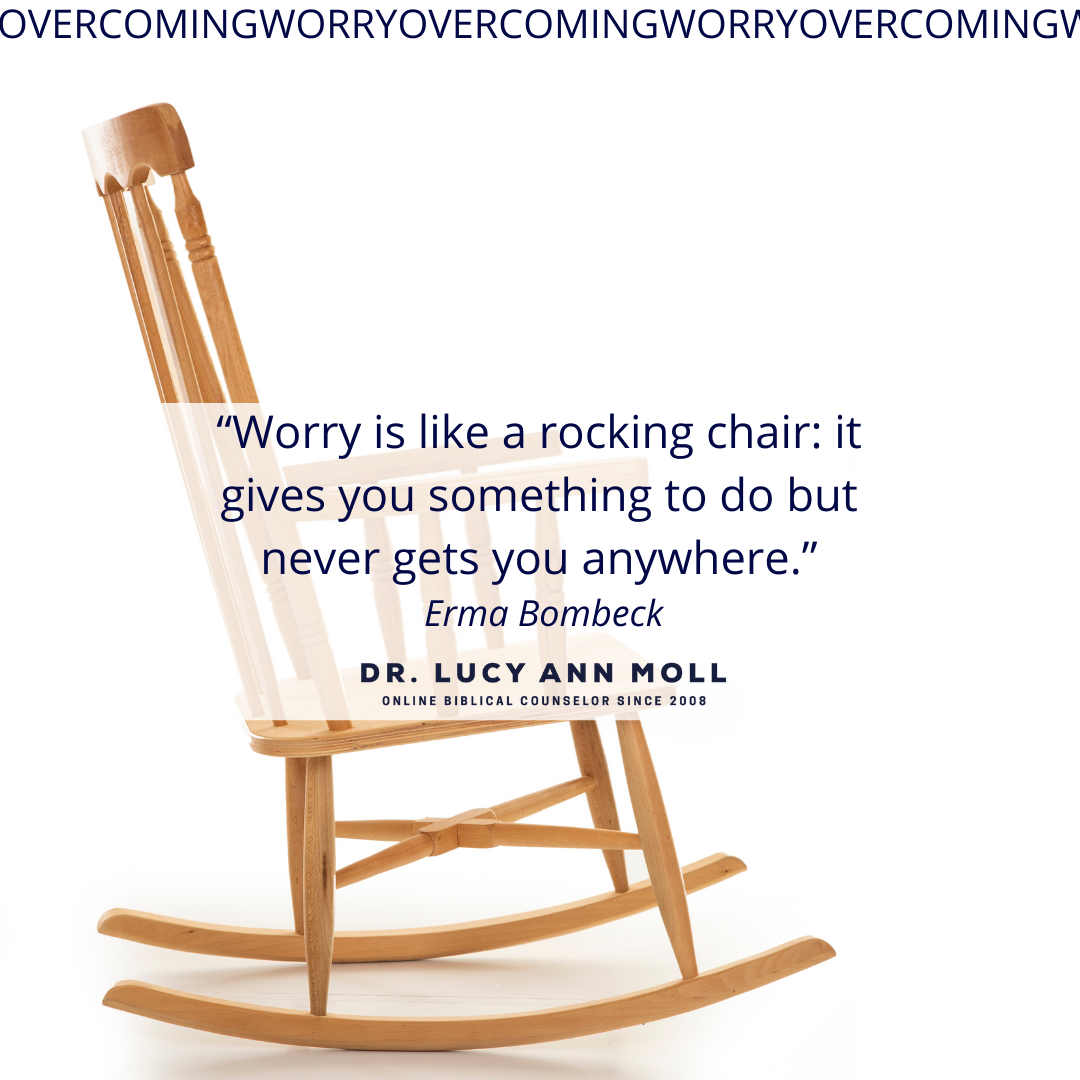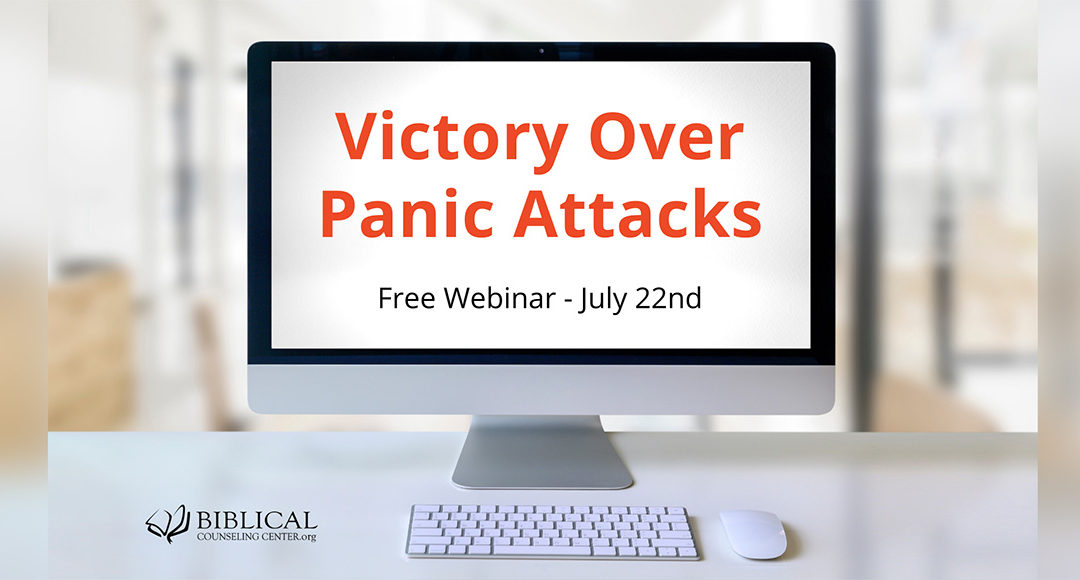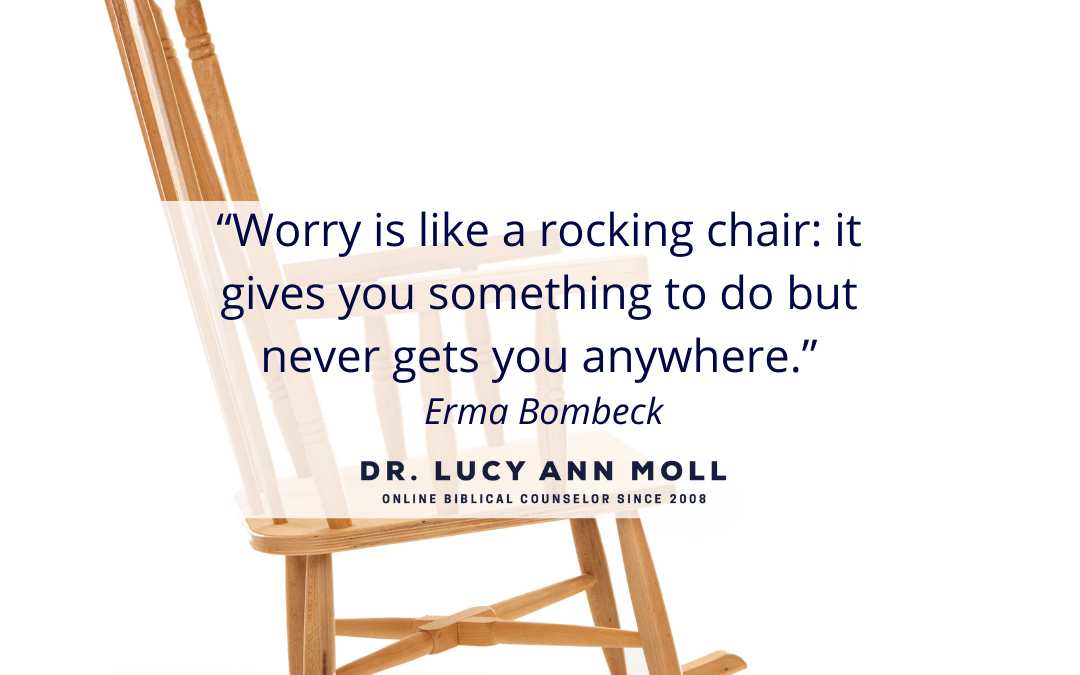
by Lucy | Jul 20, 2021 | biblical counseling |
When panic attacks occur, the sufferer hopes that the terror will stop instantly and never return. This is a certain truth about panic attacks: no one wants them, ever.
Panic attacks are brief episodes of intense dread accompanied by physical symptoms like an irregular or rapid heartbeat and sweaty palms. When you’re in the middle of one, they seem anything but brief.
Let’s uncover the five lies of panic attacks that you need to know, whether you or a loved one has this common condition.[i]
P.S. On Thursday, July 22, at noon CT, I’ll be leading a free live webinar on Victory Over Panic Attacks, and you are invited!
If you cannot make that date, no worries; You can get the replay along with helpful handouts including action plans! But to get them, you must register for the webinar. The spots are filling up, so act now.
REGISTER FOR THE FREE WEBINAR
Lie #1: If God loved me, He would take this away.
TRUTH: God loves you despite your fear.
Knowing the link between fear and panic attacks helps us to gain an accurate view of our anxiety, and to rest in the truth that God loves His children, especially those of us who fight fear (1 Thess. 5:14).
Fear isn’t all bad. It is a God-given emotion that alerts us to danger, real or perceived. Anxiety is what we feel when our body is responding to the emotion of fear.[ii] It is the mind and body’s reaction to stressful situations.
When you or I face a danger (real or perceived), our body releases adrenaline and other chemicals into the bloodstream, setting off a series of physical responses to ready us to act.
For various reasons, some people are more likely to develop panic attacks.[iii] Women are more prone to developing panic attacks than men.
Also, there is a strong genetic link. For instance, people with a close biological family member with panic disorder are up to eight times more likely to develop this condition.
No one wants to be anxious, of course. Yet when we get to the heart of anxiety, we learn what we truly value.
Remember that “you did not receive a spirit that makes you a slave again to fear, but you received the Spirit of sonship. And by him we cry, ‘Abba, Father’” (Romans 8:15).
This can be incredibly empowering. In Christ, you have been set free (Gal. 5:1) and made a child of God, even though you may feel like a slave to the fear of panic attacks.
Lie #2: Only medication can help me, OR if I were a stronger Christian, I wouldn’t need meds.
TRUTH: A balanced approach to medication is wise.
As many more Americans have turned to anxiety prescription medication since the coronavirus crisis to calm their nerves,[iv] we may wonder about their role in easing panic attacks.
- Is medication the best option to address panic?
- Should we avoid medication altogether?
- Does using medication mean I’m a weak Christian?
First, no medication cures panic attacks. Rather, medicine can work to change the way that the body responds to fear, usually by slowing a normal biological process that is responding to a perceived danger.
Second, no medication can change our thinking. Only counseling can do that, whether from a friend or a biblical counselor or through self-counsel.
Medication can address these responses sometimes, but it does not deal with the heart. As a top article at Biblical Counseling Center’s websites puts it:
Medicine can change the way anxiety feels, but it can’t address the object of your fear. One of the things we all must realize is that the Creator God designed our bodies to feel fear and for our bodies to respond with energy to put us into motion. Simply muting the intensity of those bodily reactions and feelings by medically suppressing the natural chemical reactions in otherwise healthy bodies doesn’t solve one’s anxious thought patterns.[v]
The counselors at Biblical Counseling Center believe that the decision of whether or not to take anxiety medication is a personal one that is best made in consultation with your physician. Contrary to the popular myth, Biblical Counselors are not opposed to all psychiatric medicine use.
Whether you use medication or have decided against it, or if your loved ones have struggled over your decision, please know that you are never alone. You might remind yourself of this verse when you battle fear:
“The Lord is my light and my salvation;
whom shall I fear?
The Lord is the stronghold of my life;
of whom shall I be afraid?” (Psalm 27:1)
Lie #3: Panic attacks are mostly a physical problem.
TRUTH: The body and mind are intertwined.
The bodily responses to panic are well known: your heart beats double-time, you may be shaky, maybe even lightheaded, and it may feel like a bear is sitting on your chest, metaphorically (or you’d really have something to worry about, right?).
You might also have chills, numbness in the fingers and toes, sweaty palms, and other panic symptoms that sometimes seem to come out of the blue.
Since panic symptoms are physical, this means panic attacks are mostly a physical problem, right? The truth is, while anxiety is entwined with our bodies, it originates in anxious thinking.
“For as [a man] thinks in his heart, so is he” (Proverbs 23:7, NKJV).
What we think, believe, and desire in our hearts is what we do. The heart is the immaterial part of us. It consists of our thoughts, emotions, and will. So, if we imagine that we are in danger, we may run and hide, and have a rapid heartbeat and other bodily responses to fear.
So scary are these symptoms that we may seek emergency medical help. Each year millions of Americans with anxiety-induced panic attacks visit a hospital emergency department complaining of chest pain, trouble breathing, and dizziness, fearing a heart attack.
A researcher found that “anxiety contributed to chest pain experienced by 30 to 40 percent of low-risk patients seen in hospital emergency departments.” [vi] Of course, it is wise that someone showing symptoms indicating a life-threatening disorder would seek emergency care.
As we address our fear, we can learn to slow our anxious thoughts that feed panic attacks.
Lie #4: I just need to do better to avoid my triggers.
TRUTH: Avoiding the situations you fear deepens your fear, so don’t do that.
Let’s start with a definition of a trigger. A trigger is a situation, location, or person that reminds someone of a past or current difficulty,[vii] even a panic attack.
This lie suggests that if we stay away from a feared situation – flying, heights, spiders, driving, and so on – then we will be happier and have more peace because we’ll be panic-free.
But the problem is not the trigger per se. It is our heart response to it. What we fear controls us. Andrea Lee explains it this way:
When we label someone or something a “trigger,” we shift the place of emotional control from our own heart to an external object. The connection between an event and emotion can mistakenly lead us to think the trigger is a cause. Actually, we have developed habits of thoughts in response to pain that continues to lead to these predictable emotional conditions.[vii]
The more we avoid our fears, the stronger they may become. In fact, a panic attack is a one-step-removed problem. When we focus on our physical responses to fear, it is easy to lose sight of our real problem; that is, a habit of anxious thinking.
When we repeatedly think about fearful events that may happen, we unintentionally train our thoughts toward hypervigilance and nervousness. When this habit is formed, it doesn’t take much to have another panic attack.
Scripture informs us to “take every thought captive to obey Christ” (2 Cor. 10:5). This means we need to unlearn our fear habit and rely on God to provide everything we need for victory.
To accomplish this, we can develop action plans that help us before, during, and after a panic attack. In the coming weeks, we’ll tell you more about these action plans that can help you break free from fear.
Lie #5: Counseling can’t help me, it’s a lost cause.
TRUTH: The right counseling that is based on love and truth brings freedom.
No one is beyond hope. While we’ve all had seasons when we feel like giving up, God’s grace is sufficient for us to believe the Gospel and to put our faith into action.
Biblical counseling points us to the timeless and trustworthy truths of God’s Word.
At BCC, we often say, “faith is believing the Word of God and acting upon it, no matter how I feel, knowing that God promises a good result.”
When we face our fear of having a panic attack, we need to make a choice to believe God and his care for us even in the event of another panic attack.
Basically, we need to practice biblical truth, especially Phil. 4:4-9. This passage tells us to rejoice, pray, give thanks, guard our hearts and minds, think about the good things of God, and practice the joyful attitude and living that that apostle Paul had shown believers.
And it ends with this promise: “the God of peace will be with you.”
As we face our fear God’s way, His truth replaces the lies of panic attacks, and we learn the true way of peace:
“You keep him in perfect peace whose mind is stayed on you, because he trusts in you” (Isaiah 26:3).
[i] Every year, up to 11% of Americans experience a panic attack. Approximately 2% to 3% of them go on to develop panic disorder. (Cleveland Clinic, “Panic Disorder”)
[ii] Tim Allchin, “How Jesus Addressed Fear, Worry, and Anxiety,” October 1, 2019
[iii] Katherine Star, PhD, “Panic Disorder Risk Factors,” December 4, 2020
[iv] Bruce Golding, “More Americans Turning to Anxiety Medication amid Coronavirus Pandemic,” May 25, 2020
[v] Tim Allchin, “Should Christians Use Anti-Anxiety Medication?” October 15, 2019
[vi] Indiana University, “Heart Attack or Panic Attack?” April 15, 2019
[vii] Andrea Lee, “Troubled by Triggers,” March 20, 2018

by Lucy | May 27, 2021 | biblical counseling, thoughts |
All of us talk nonstop in our heads, but few of us think well. Our nonstop thoughts are typically negative or downright nasty.
- “You’re so stupid.”
- “I just cannot take one more sleepless night.”
- “Things are never going to change. I’m stuck.”
- “No one loves me.”
Thoughts are powerful, aren’t they? What we think directly affects our emotions and actions. Consider this Scripture on thought-power: “For as he thinks in his heart, so is he” (Proverbs 23:7, NLT).
It is wise, then, that we become aware of what we think, and root out the lies we believe and replace them with the truth that sets us free. When we think well, our emotions and actions will line up with God’s Word, and we will become increasingly free of anxiety, worry, anger, despair, and enslavement to everything from pizza and Chardonnay to social media and erotica.
What we believe on, we will inevitably act on.
What is “thinking well”?
To think well you need to continually believe God’s truth. “Continual,” a present participle in the Greek, basically means, now that you believe Christ for your salvation, keep on continually believing Him all day, every day. “Therefore, as you received Christ Jesus the Lord, so walk in him” (Col. 2:6, ESV).
When you continually believe God, you are thinking well, and your emotions and actions fall in line.
Continual belief is a faith walk. It’s not easy. Consider folks in the Bible who harbored the sin of unbelief; that is, rejecting what God says is true. Among them:
Abraham. He lied. He passed Sarah off as his sister to protect himself against Egypt’s pharaoh. Moses. He murdered. David. He bedded another man’s wife. Yes, adultery. Naomi. She pity-partied. And Eve. She and her husband ate the forbidden fruit and. You know the rest of the story.
CHALLENGE: Imagine how your emotions would soar if you continually believed God and grasped how to think well. Do you want a huge drop in fear or anger or depression or addiction?
But how do you “think well”?
To think well is to choose thoughts that agree with God’s truth and that result with in action steps. Here are the four parts:
- Clue in to your current emotions.
- Watch what actions follow these emotions.
- Begin to identify the lies you believe.
- Replace the lies with God’s truth.
And, lastly, take a specific action step that aligns your life with the God’s truth. As we overcome the toxic, ungodly thinking that distort our emotions, we’ll discover the contentment in Christ. Who doesn’t desire that?!
If you would like a FREE Think Well chart to help you get stop negative thinking, send me a contact message and mention the chart.
Question: What is one thing that you will do to think well?

by Lucy | Apr 24, 2021 | biblical counseling, relationships |
Who do you aim to please? Your boss, your husband, your reputation, your bank account, your dog … yourself?
Anything or anyone placed ahead of God can become an idol. These may include things like,
- approval
- love
- comfort
- security
- significance
These seem innocuous, but they can ensnare us. They keep wanting more and more. Feeding an idol is a horrible, exhausting way to live.
In this article, we’ll first get a picture of what idol-worship may look like. It may be more common than you think. Then we’ll discover its antidote: growing in the fear of the Lord.
Meet an idol-worshiper.
Linda (name and some details have been changed) deeply desires that her Christian husband stop binge-drinking. His problem is obvious, but what’s hers?
She thinks that if she acts sweet (by picking up the kids’ toys before he returns home from work and by making nice dinners, for example), then he’d quit drinking and she’d get what she wants.
But no matter how sweet she is or how often she pleads with him to stop drinking, he continues to buy a 12 pack of beer and guzzle all of the beers when he comes home after work. Not every night … but often enough to cause her concern and fill her with fear.
There is nothing wrong with wanting a husband who makes wise choices. But when a desire becomes a demand, we have begun to make it an idol.
What’s her idol? Security. She says to herself, “I must have a godly and sober husband who cares for me and the kids, or I cannot be happy.”
You worship what you fear.
How do we tell if we are pleasing someone or something instead of God? Elyse Fitzpatrick nails it:
If she is willing to sin to obtain her goal or if she sins when she doesn’t get what she wants, then her desire has taken God’s place and she is functioning as an idolater.
Look back to the example of Linda. When her husband disappears into the garage with his 12-pack, she pouts and pleads, worries, and falls into self-pity. Her actions are understandable. Yet they are sins that she needs confess. This may not seem fair. We often sin in response to being sinned against.
A husband yells at his wife, the wife screams at the kid, the kid kicks the dog.
This dynamic may play out in your life too. It does in mine. When a friend failed to get back to me, and I feel ignored, I may sulk. When my husband seems more interested in TV than me, I may snap at him.
Choose better … please God only.
In her book Holy Fear, Christina Fox helps us to trade lesser fears for the fear of the Lord. Here are three ways she highlights.
1. Study God’s word.
To grow in the fear of the Lord, we must know him, and the very best way is to study God’s word. When we read scripture, we can ask ourselves, “What does this teach me about God?” The more we learn about who God is, the more we grow in our fear of him.
2. Remember God’s works.
As we recall that God rescued the Israelites from slavery in Egypt, the prophet Jonah from the belly of the great fish, the apostle Paul from death time and time again, we grow in the fear of the Lord and desire to please him only. Great ways to remember God’s works today: worship with other believers on the Lord’s Day, sing praises to him, and share at the communion table.
3. Pray for greater fear.
Prayer helps us to depend on God more and ourselves less. “We find our hearts reshaped to want what God wants more than what we want,” Fox says. “We grow to want his glory and fame spread throughout the world and not our own. Indeed, prayer not only feeds and nourishes us, it transforms us.“
So who do you now aim to please?
God is jealous for our love. He hates your giving it to anyone or anything but him.
You shall have no other gods before me. (Exodus 20:3)
As we grow in the fear of the Lord, we will aim to please him, not a person or a thing like money, approval, security, or any lesser fear. When Linda came to realize that she wanted security above all things, even God, she agreed with the Lord that her desire was misdirected. She poured out her heart to the Lord, asking him to help her love him most of all.
Her husband still drinks sometimes, but less than before. Most importantly, she has a new attitude that God will provide her everything she really needs. The Lord is her safe place.

 While it demonstrates a lack of faith, ordinary worry that most of us experience does not result in significant impairment: someone who worries can still hold down a job, study for exams, put a finishing touch on a sermon, and so forth.
While it demonstrates a lack of faith, ordinary worry that most of us experience does not result in significant impairment: someone who worries can still hold down a job, study for exams, put a finishing touch on a sermon, and so forth.






